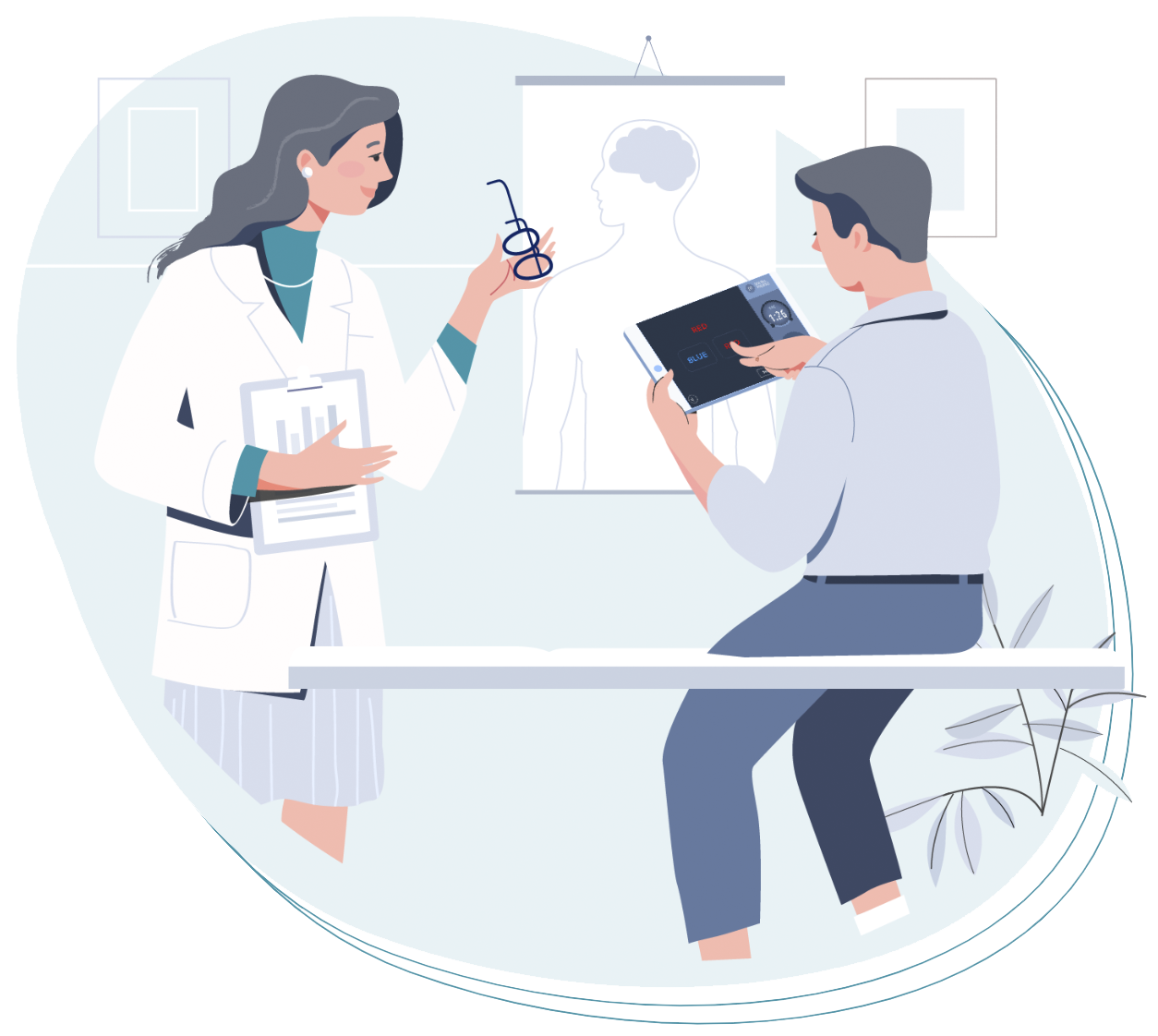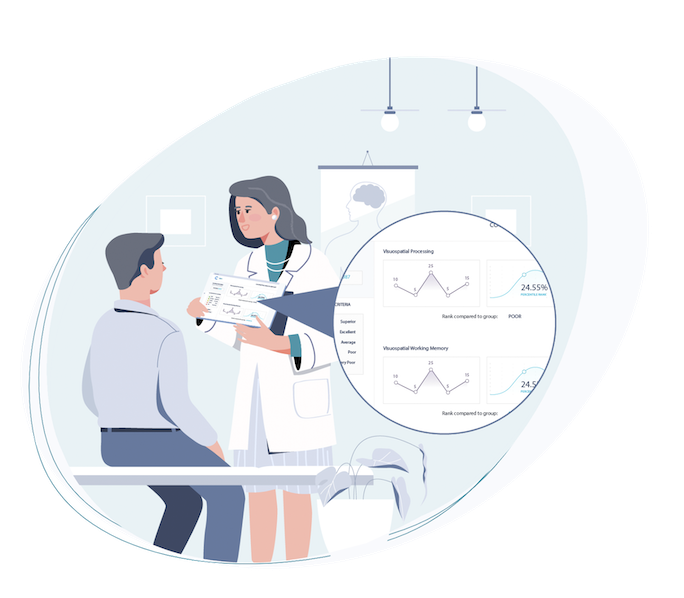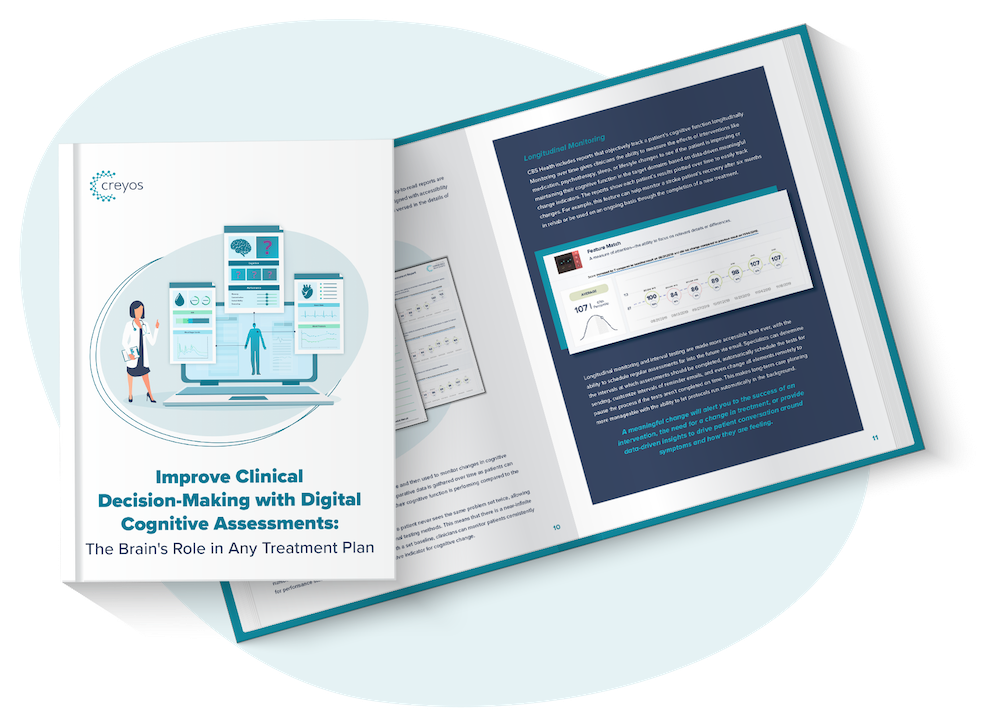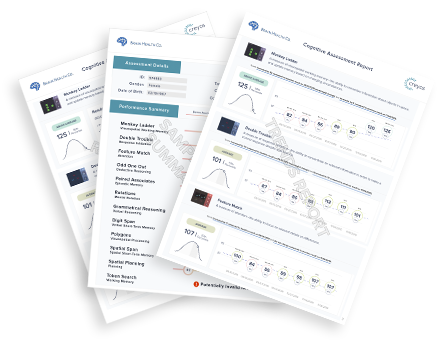Discussing the Importance of Cognitive Health
Healthcare has been moving toward a more proactive and patient-centered approach.7Annals of Internal Medicine, Patient-Centered Decision Making and Health Care Outcomes: An Observational Study, Apr 2013 As such, it’s important that clinicians give patients context into their healthcare journey so they can be active participants.
For Healthy Patients: Integrate Cognitive Care Into Health Care
Discussion Tips:
- Collaborate and allow for shared decision-making
- Build empathy and trust
- Provide emotional support and physical comfort when appropriate
Objective cognitive data, even in healthy patient populations, is invaluable and can provide a baseline for future brain health assessments. At every patient checkup or doctor’s appointment, vitals like blood pressure, motor function, and respiratory rate are measured so that physical health can be monitored over time—why should cognition and brain health be any different?
Establishing cognitive status can help identify any current undiagnosed cognitive concerns, and by maintaining a record of brain health, status changes can be easily detected. While the benefits of integrating cognitive health into healthcare are apparent to some physicians, remember that patients may be unaware or wary of brain health measurements. It’s essential to make it clear to these patients that cognitive health can provide insights into many other components of health. To make the most of those insights, an objective baseline must be established while the patient is generally healthy.
Discussion Tips:
- Collaborate and allow for shared decision-making
- Build empathy and trust
- Provide emotional support and physical comfort when appropriate
Baseline measures combined with longitudinal monitoring give patients insight into how their brain health is changing over time, allowing them to better collaborate with clinicians to improve or maintain cognitive function.
Discussion Starters
“I'd like to also get a quick measure of your brain health. Your brain is as important as your heart, so we should do a cognitive assessment just like we do a blood pressure check. We can see which areas you're strongest in right now, on a regular day.”
“Let's check your cognitive function again to see if anything has changed. Don't worry, you might do a little bit better or worse than last time, and that's normal, but this will help us see whether your memory, reasoning, concentration, and verbal ability stay steady over time.”
“It's normal to feel like you're getting more forgetful as you get older, but objectively, it looks like you're doing just fine for your age. Let's do another test when there are any changes to your health, medications, or lifestyle, then we can compare those results to today's baseline to see if there are any cognitive symptoms to be concerned about.”
For Patients With Emerging Health Concerns: The Invaluable Baseline
Whether due to a specific event or normal aging, all patients have the potential to transition from the healthy population to the unhealthy population. The level of care that can be provided when a cognitive baseline is established has the potential to significantly improve patient outcomes. This is because a patient’s cognition can be interpreted not only in relation to population norms, but in comparison to a personalized benchmark unique to each patient. An individualized result like this can take some of the guesswork out of interpreting data, such as making assumptions about cognition based on education level or profession. A change in function can provide clinicians with a powerful diagnostic aid for any condition with cognitive symptoms, an objective confirmation of subjective concerns raised by the patient, and may even uncover early warning signs before the patient notices any subjective changes to areas such as memory, attention, and decision-making. Ultimately, a baseline is an invaluable tool for personalized, patient-centered care.
Discussion Starters
“Your blood test results are getting close to the cutoff supporting a diagnosis for that condition we’ve been keeping an eye on. Let’s do another brain health assessment to see if the cognitive symptoms are consistent with a change to your health.”
“As we work together to keep you feeling your best, we can have you do these cognitive tests again to compare to your previous results. That way we can try to rule out anything else like health issues, medications, or lifestyle changes that could be causing you to feel less than your best.”
“You mentioned you’ve been experiencing brain fog, right? I’m going to send you a quick cognitive task, then we’ll compare the results to the population and to your baseline result. That way, we'll have a better idea of whether your cognitive concerns are a result of a potential condition or part of life's normal ups and downs.”
For Patients With Clear Health Concerns: Broaching Sensitive Subjects
Cognition and brain function affect the very fabric of who a person is. A decline in cognitive health can be frightening because it may mean that significant changes to quality of life lie ahead. Whether the patient suspects something is wrong or not, introducing the topic in a sensitive manner can create a safe space to explore an assessment, diagnosis, or treatment plan.
Discussion Tips:
- Have discussions in a familiar environment
- Keep the tone positive and upbeat
- Engage, orient, and explain, then reengage, reorient, and reexplain as needed
- Keep statements simple and direct
It’s important to remember that confusion and loss of short- or long-term memory are some of the most common signs of cognitive decline, whether from an incident, changes to mental and physical health, or aging.8Psych Guides, Cognitive Problems, Symptoms, Causes, and Effects These are all elements that must be considered when talking with patients. These types of impairments can be extremely disorienting and, of course, patients may not remember previous conversations.
For unhealthy populations, it’s particularly important to complete ongoing monitoring and long-term follow-ups. Whether this follow-up is for a specific disease diagnosis, such as mild cognitive impairment (MCI), or a cognitive event, such as traumatic brain injury (TBI), measuring ongoing treatment effectiveness with objective measures makes it possible for clinicians to see if patients are improving or maintaining cognitive function. Clinicians can present this information to patients so they can be involved in making informed decisions about their treatment plan, whether that includes continuing treatment, making adjustments, or trying something new. Especially in the case of more complex, ongoing cognitive issues, completing assessments for long-term monitoring helps maintain the connection between clinician and patient and makes it possible to notice any significant changes early on.
Discussion Tips:
- Have discussions in a familiar environment
- Keep the tone positive and upbeat
- Engage, orient, and explain, then reengage, reorient, and reexplain as needed
- Keep statements simple and direct
Discussion Starters
“Because we started you on that new medication a few months ago, I’d like to have you complete another cognitive assessment. This will help us determine if this treatment is working or if there have been any unwanted cognitive side effects.”
“Given your current diagnosis, we want to go ahead and do another assessment of your brain health, and keep doing them every few months. This will allow us to see if anything is changing and catch any changes early enough to make educated decisions about treatment options.”
“It’s been a few months since your injury. I know recovery has been gradual, but let’s try a few cognitive function tasks to see how you are progressing since we got started.”
Dealing With Anosognosia
Studies estimate that 60 percent of patients with mild cognitive impairment (MCI) and 81 percent of patients with Alzheimer’s disease exhibit some form of anosognosia, where the patient is unaware of their neurological deficit or psychiatric condition.9StatPearls, Anosognosia, Jun 2022 Because of this, results of cognitive assessments and any subsequent diagnosis should be handled with the utmost sensitivity. While the frightening consequences of a diagnosis may make some patients anxious about discussing results, many surveys indicate that most patients with or without memory impairment would want to know if they had dementia.
10, 1110U.S. Department of Health and Human Services, Providing and Discussing a Dementia Diagnosis with Persons Living with Dementia (PLwD) and Their Care Partners, Oct 2018
11Clinical Interventions in Aging, Patient Characteristics Associated with Screening Positive for Alzheimer’s Disease and Related Dementia, Sep 2018



